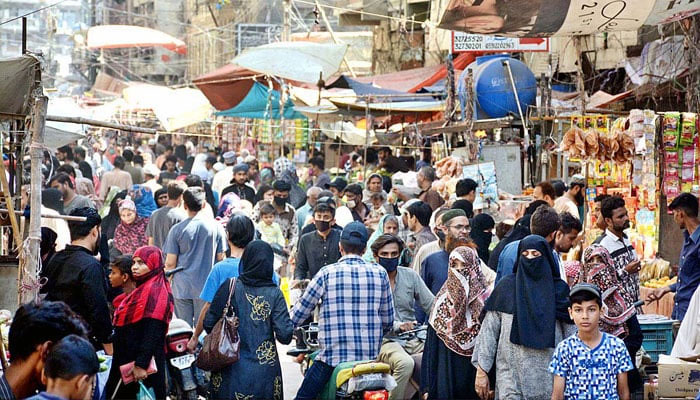Traders, restaurant owners reject energy conservation plan
Traders and restaurant owners rejected the government measures, terming the policy counterproductive rather than being productive
KARACHI/ISLAMABAD: Hours after the federal government came up with its fresh energy conservation plan, traders and restaurant owners rejected the measures announced, terming the policy counterproductive rather than being productive.
Condemning the restrictions — which are to be imposed by the Centre after consultations with the provinces — President All Pakistan Anjuman-e-Tajran President Ajmal Baloch Tuesday urged the government to immediately withdraw its decision to close markets and restaurants at 8pm.
Under its National Energy Conservation Plan, the government decided that the timing of wedding halls would be limited to 10pm, while restaurants, hotels and markets would closed by 8pm.
However, it was learnt that there may be some room for the closing time for restaurants to be extended by an hour. “The government, before defaulting the country, will bankrupt all traders,” he said, adding that traders purchase the most expensive electricity from 6pm to 8pm.
Warning the government of protests across the country, Baloch said: “The coalition government has wreaked havoc on the economy of Pakistan.” Karachi Electric Dealers Association President Rizwan Irfan lamented that the traders were already facing difficulties due to electricity and gas loadshedding. He warned that merchants would take strict actions in case these time restrictions are imposed.
Meanwhile, All Pakistan Restaurants Association (APRA) Chairman Athar Chawla termed the national energy conservation plan “counterproductive” rather than a productive approach to resolving Pakistan’s energy crisis. He explained that if more people were dining in restaurants at night, then less energy would be consumed compared to them staying indoors.
APRA’s Senior Vice President Suleman Chawla wrote a letter to Minister for Defence Khawaja Asif, who unveiled the cabinet’s decision in a press conference earlier Tuesday, for assistance in removing time limits.
“All restaurants carry an inventory of perishable items, which is to be kept in cold storage 24 hours a day and seven days a week, another major electricity consuming machinery are air-conditioners which are already off due to winter season,” the letter read, adding that therefore closing restaurants early will “not help to conserve any energy.”
Recalling the economic damage suffered during COVID-19, the association, which is a registered member of the Federation of Pakistan Chambers of Commerce and Industry (FPCCI), mentioned that almost 50% of restaurants are running in losses due to the prevailing economic situation. “Any further restriction will aggravate the situation resulting in huge unemployment and loss of revenue for the government,” it said, mentioning that 40 industries allied with the restaurants will also suffer due to these restrictions.
The APRA requested the authorities concerned to allow restaurants to operate dine-in till 1am and take away and delivery should be allowed 24/7.
Agencies add: The Pakistan Tehreek-e-Insaf has also rejected the loadshedding reduction formula unveiled by the government, terming it an unrealistic scheme, which would only add to the woes and miseries of masses. In a statement, the PTI said the government had made an excuse for selling electricity at higher rates merely to fetch hefty kickbacks and commissions.
-
 Kim Kardashian And Lewis Hamilton Make First Public Appearance As A Couple At Super Bowl 2026
Kim Kardashian And Lewis Hamilton Make First Public Appearance As A Couple At Super Bowl 2026 -
 Romeo And Cruz Beckham Subtly Roast Brooklyn With New Family Tattoos
Romeo And Cruz Beckham Subtly Roast Brooklyn With New Family Tattoos -
 Meghan Markle Called Out For Unturthful Comment About Queen Curtsy
Meghan Markle Called Out For Unturthful Comment About Queen Curtsy -
 Bad Bunny Headlines Super Bowl With Hits, Dancers And Celebrity Guests
Bad Bunny Headlines Super Bowl With Hits, Dancers And Celebrity Guests -
 Insiders Weigh In On Kim Kardashian And Lewis Hamilton's Relationship
Insiders Weigh In On Kim Kardashian And Lewis Hamilton's Relationship -
 Prince William, Kate Middleton Private Time At Posh French Location Laid Bare
Prince William, Kate Middleton Private Time At Posh French Location Laid Bare -
 Stefon Diggs Family Explained: How Many Children The Patriots Star Has And With Whom
Stefon Diggs Family Explained: How Many Children The Patriots Star Has And With Whom -
 ‘Narcissist’ Andrew Still Feels ‘invincible’ After Exile
‘Narcissist’ Andrew Still Feels ‘invincible’ After Exile -
 Shamed Andrew ‘mental State’ Under Scrutiny Amid Difficult Time
Shamed Andrew ‘mental State’ Under Scrutiny Amid Difficult Time -
 Bad Bunny's Super Bowl Halftime Show: What Time Will He Perform Tonight?
Bad Bunny's Super Bowl Halftime Show: What Time Will He Perform Tonight? -
 Where Is Super Bowl 2026 Taking Place? Everything To Know About The NFL Showdown
Where Is Super Bowl 2026 Taking Place? Everything To Know About The NFL Showdown -
 Chris Pratt Explains Why He And Katherine Schwarzenegger Did Premarital Counseling
Chris Pratt Explains Why He And Katherine Schwarzenegger Did Premarital Counseling -
 Drake 'turns Down' Chance To Hit Back At Kendrick Lamar At Super Bowl
Drake 'turns Down' Chance To Hit Back At Kendrick Lamar At Super Bowl -
 Sarah Ferguson Had A ‘psychosexual Network’ With Jeffrey Epstein
Sarah Ferguson Had A ‘psychosexual Network’ With Jeffrey Epstein -
 Miranda Kerr Shares The One Wellness Practice She Does With Her Kids
Miranda Kerr Shares The One Wellness Practice She Does With Her Kids -
 Czech Republic Supports Social Media Ban For Under-15
Czech Republic Supports Social Media Ban For Under-15




